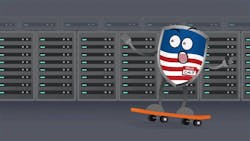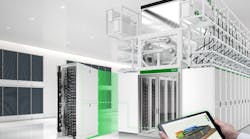How to Talk to Colocation Providers for Your New Data Center
In February 2025, Goldman Sachs exposed what we in the data center industry already knew – AI is driving data center power demands. According to Goldman Sachs Research, global power demand from data centers will increase 50% by 2027 and as much as 165% by the end of the decade.
As was evident during Data Center Frontier Trends Summit 2024, it’s the mad dash for companies – and governments – to identify locations that can power and safely store critical AI IT infrastructures. In the past 12 months, numerous companies, particularly venture capital organizations, have invested billions of dollars in building data centers across the U.S. to meet this demand.
Of course, this means billions of dollars in revenue for the data center builders themselves. The cooling peeps, the rack builders, and the network strategist are all making money before the data center is even up and running with its first server connected to the Internet. Heck, the local government where that data center is being built is even building a revenue stream from a “future data center site” before any client can use it.
To sum it up, billions are being spent to increase data center power before any client actually signs a contract to lease space, power, and connectivity in the data center itself.
As a colocation provider offering “retail” space, these new buildouts are generating an endless stream of cold calls from new data center, edge computing, and hyperscale providers seeking a colocation provider as an “anchor tenant” to bring into their facility. Many of these calls end the same way – contact us when the data center is up and running.
Now, let me back up for a second before I continue – there are MANY companies out there that are happy to sign long-term data center leases. These companies are all too happy to sign long-term lease agreements for cost savings and to aid in shaping the data center buildout to fit their needs. However, not all colocation providers are those companies. Not all colocation providers want a large “wholesale” deal that they in turn need to fill up to make a dollar.
So does it make sense to reach out to a “retail” colocation provider to fill up your empty, soon-to-be-built data center? Maybe, but here are a few things to consider:
1. Timeframe
First and foremost, when is the data center going to be ready? Are you calling us, and the data center is not going to be ready until Q3 2026? Sure, it’s nice to know you are building a new facility in a new part of town or revamping a downtown location, but a lot can happen in a year. Chances are that I am not going to sign a contract for a data center that has the potential for 200MW when you are a year out from “opening” the facility. I mean, come on, friends, you can't even guarantee everything will be ready that far in advance. There is a lot that goes into building a data center and, well, a lot that could go wrong. Of course, not saying it is will but let’s sync up closer to the actual open date.
2. Connectivity
Don’t get me wrong, I know that connectivity offered as part of the data center lease agreement is not always the norm (rather, a bit unusual depending on the data center facility owner). Then again, for those who care and are looking for a “packaged” deal, connectivity and the available network options can be a make-or-break factor when signing a new lease agreement. Before calling the provider, ask yourself, “What is our plan for connectivity?” Do you already have fiber lines set up and ready to go for that first tenant, or does the colocation provider need to bring in their network contracts?
If you are bringing in specific ISPs, let us know who and when. Are you gradually growing your peer network? If so, what does that timeframe look like? Just providing the facility with the capability of powering up MW deals is not attractive to all providers – do your research on what the colocation provider offers and if they are looking for a “carrier hotel.”
3. Data Center Remote Hands Support
Let’s take a moment to chat about support. Yes, full 24/7 support should be something that the colocation provider offers to their “retail” clients as part of their service, not something a data center facility owner must provide. Then again, if we are signing a long-term lease agreement at a new facility and you do not have an electrician on 24/7 call, let’s just say the answer is “no.” There needs to be an understanding and plan on what happens if (and when) something goes wrong. Please make sure to let us know how many staff you have onsite and when they are available to resolve issues.
4. The Boring and the Awesome
Last but not least – tell us the boring specifics and tell us the awesome “new” things your facility is offering. Have power redundancy and cold spares? Sure, you do – let us know how many and the capacity of the generators. Have a new way of cooling your facility through green energy sources? Awesome, now tell us what makes it unique and how we may sell that idea. Tell us the things that you believe should be an “industry standard,” but more importantly, tell us what makes your facility unique and why we should choose your facility over the facility down the road (and trust me, there probably is one there also looking for our business).
About the Author

Samantha Walters
With over a decade of experience in technology and telecommunications, Samantha Walters brings a blend of corporate leadership and entrepreneurial innovation to her role as CEO of Colocation America. She previously founded Textbook Balanced, a consulting firm focused on empowering nonprofits and mission-driven businesses through strategic digital marketing. Walters first partnered with Colocation America as a consultant, where her work in brand strategy and market analysis led to a successful collaboration and, ultimately, her recruitment to lead the company. Now at the helm, she is focused on expanding the company's national presence, advancing enterprise and edge services, and championing sustainable innovation.
Colocation America is a premier data center services provider offering colocation, dedicated servers, managed hosting, and network services across 20+ data centers in the United States. With a commitment to reliability, connectivity, and customer service, Colocation America helps businesses stay connected and competitive in a digital-first world.



